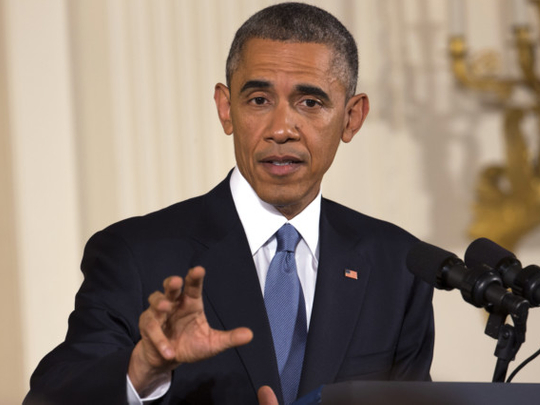
In 2000, General Colin Powell was elected president of the United States. He rode into office on high favourability ratings resulting from his successful stint as the chairman of the Joint Chiefs-of-Staff. His core conviction was best captured in his 1996 Republican National Convention speech, in which he proclaimed that a united America is made stronger because of its differences, not in spite of them. And despite his allegiance to the Republican Party, strong black voter turnout and support helped him become the first black president.
Of course, this is all fairy-tale conjecture!
In reality, Powell chose family and privacy over the invasive process of running for office, but America still learned what a black presidency would look like when Barack Obama rode into office on the strength of his 2004 Democratic National Convention speech, the philosophical offspring of Powell’s 1996 address. Despite being a Democrat, Obama’s worldview and political beliefs are right out of the book of Powell.
The truth is, Obama and Powell’s political views owe more to their blackness than to their respective parties. Though one is a Democrat and the other a Republican, they are cut from the same political cloth that adorns many black American voters. It is stitched from a black American culture that values the traditional Republican-platform tenets of social conservatism, fiscal responsibility and a strong national-security posture. And then it is dyed in a black American experience that supports the Democratic principles of civil rights protections and a communal responsibility for equal access to economic opportunities. The result is a black politician who is sometimes liberal and sometimes conservative.
The nuanced views of black politicians with national appeal often invite analysis of whether they truly adhere to the ideology of their chosen parties. For example, in 2010 The Root’s David Swerdlick noted that Obama governs like a moderate Republican. More recently, in the American Conservative, former Ronald Reagan appointee Bruce Bartlett argued that Obama is essentially “what used to be called a liberal Republican before all such people disappeared from the GOP”. Conversely, others have opined that Powell is principally a Democrat, or worse, lobbed tacit accusations of duplicity at him.
These views, however, do not examine the role that race and upbringing play in the making of nationally competitive black politicians. With Obama and Powell as a case study, it is apparent that they are politicians born of a black American experience, not ideologically wedded to partisan platforms. As such, it is easy to imagine what a Powell presidency would have looked like because it likely would have been a carbon copy of the Obama presidency. Black politicians with wide national appeal straddle the line between conservative Democrats and liberal Republicans. This space is not a liberal shade of red or a conservative tint of blue; it is demonstrably black and independent.
On the conservative side, Obama’s national-security positions are right in step with Republican preferences and aligned with the famous Powell doctrine of overwhelming force. Both of them subscribe to the Republican narrative of hard work and personal excellence as a means to combat unfair disadvantages levied on black Americans by society as a whole. Both prioritised the reduction of annual deficits. Powell was in favour of the ‘Don’t ask, don’t tell’ policy when it came to gay military personnel serving openly, before coming out against it. Obama was against same-sex marriage before he was for it.
From a liberal perspective, both are staunchly pro-choice. Obama views affirmative action as an important method for achieving diversity in higher education. Powell, much to the chagrin of some in the GOP, views it in the same way. At various points, both have advocated a single-payer health care system. They are supporters of immigration reform that allows for an expedited path to citizenship for undocumented young people who serve in the military or pursue college degrees. And both believe in the federal encouragement of renewable energy and recognition of anthropogenic climate change.
Obama and Powell’s positions are Republican in one instance and Democratic the next, but they aren’t politically contradictory. They are, rather, largely in step with the majority views of black Americans, views that are not strictly aligned with either party on every issue. This mixed bag of partisan policies is the product of a people who have counted on the government for their civil rights protections, but who value tradition and cultural practices and desire less interference by the government in their daily lives.
Powell and Obama govern similarly because America has cast them from the same steel. As such, not only do most black politicians not have the luxury of being too liberal or too conservative, but those who reach national prominence do not have the inclination.
The soul of black folks has never been conservative red or liberal blue; it has always been self-determining and independent.
— Washington Post
Johnson is a writer, naval officer and former White House fellow. His writing focuses on race, society and politics.









